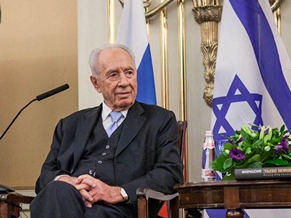|
Euroasian Jewish News

Photo by MERO Press Service.
|
Meeting of the President of Israel with the Moscow Jewish Community
08.11.2012 On November 7th, the Ritz-Carlton Moscow hotel hosted a reception for the visit of the President of the State of Israel Shimon Peres to Russia, organized by the Embassy of Israel in Moscow. The guests included rabbis, leaders and workers of Jewish organizations, cultural figures and professionals, representatives of the diplomatic service, scholars of the Near East, scholars of political studies, and journalists. The Euro-Asian Jewish Congress was represented by the Executive Directos of the Euro-Asian Jewish Congress Moscow Office Natalia Schmidt and the Deputy Head of the EAJC PR Department Nikolai Propirniy.
The President of Israel gave detailed answers to the questions of the evening's host, ITAR-TASS First Executive Director Deputy Mihail Gusman. The questions concerned the relationship between Israel and Russia, as well as the existence of the Jewish state during the Arab Spring. The President also shared his vision of global humanitarian cooperation. Shimon Peres' favorite song, “Podmoskovniye Vechera” was sung for him in Russian and Hebrew by Tamara Gverdziteli, accompanied by the Men's Jewish Chamber Choir conducted by Alexander Tsalyuk.
At the end of the meeting, the Ambassador Extraordinary and Plenipotentiary of the State of Israel in the Russian Federation Dorit Golender presented a biography of Shimon Peres that had been published in Russian, and introduced those who had made its publishing possible – the translator, publisher, and sponsors.
|
|
